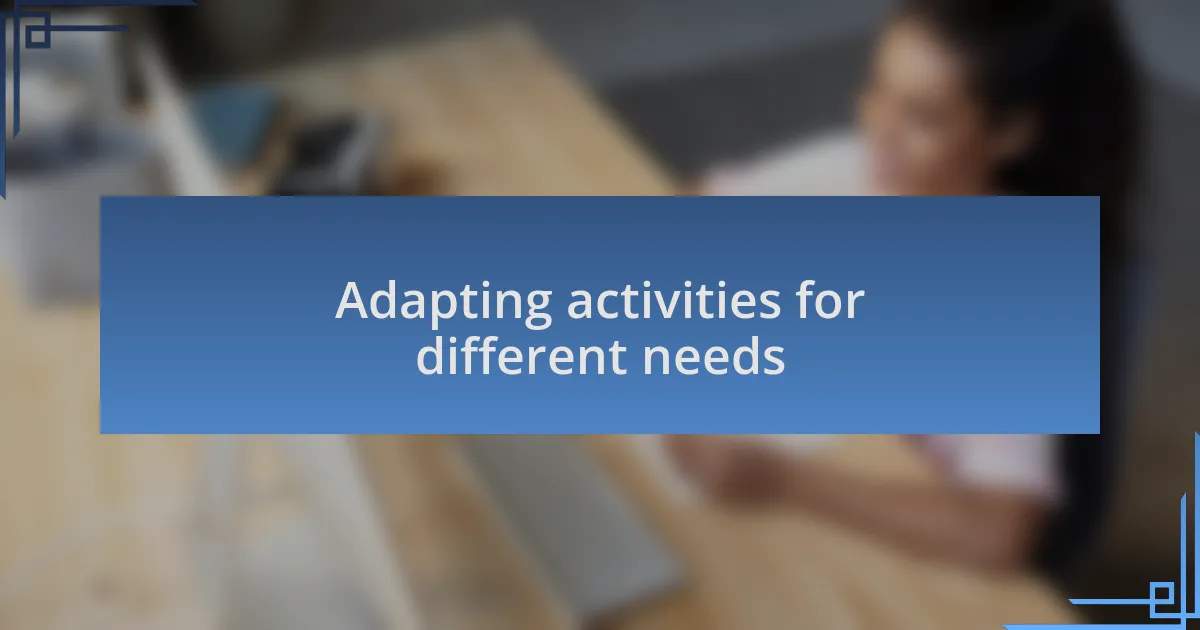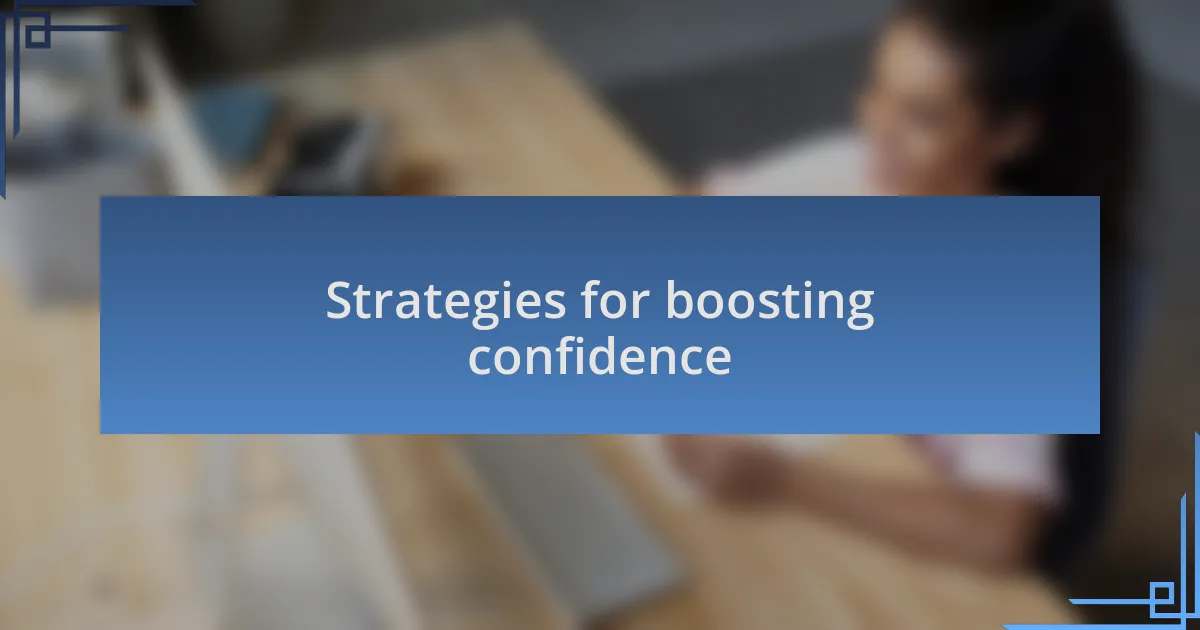Key takeaways:
- Dyslexia impacts not only academic performance but also self-esteem and social interactions, leading to isolation in children.
- Adapting activities to focus on strengths can enhance participation and inclusivity for individuals with dyslexia.
- Celebrating small achievements and fostering a supportive environment can significantly boost confidence in children with learning difficulties.
- Personal experiences, such as shared activities and successes, reinforce the importance of teamwork and overcoming challenges together.

Understanding dyslexia and its impact
Dyslexia is often misunderstood as mere trouble with reading, but its impact goes much deeper. When I first learned about dyslexia in children, it struck me how it affects not just academic performance but their self-esteem and social interactions. How many of us realized that the struggle to decode words can lead to feelings of frustration and embarrassment for kids?
Living with dyslexia can feel like navigating a maze where every turn presents a new challenge. I remember a young student who, despite being brilliant in math and art, faced significant hurdles in reading, often leading to anxiety during classroom activities. This dissonance can be overwhelming—why should a child’s talents in one area overshadow their struggles in another?
Moreover, the effects of dyslexia extend beyond the school walls. It can create barriers in family dynamics and friendships, often leaving individuals feeling isolated. I once spoke with a parent who shared how their child withdrew from playdates due to the fear of judgment. When children with dyslexia perceive themselves as different, they may inadvertently miss out on invaluable social experiences, which can be heartbreaking for both the child and the family.

Adapting activities for different needs
Adapting activities for different needs is crucial to ensure every family member can participate fully. I recall a family game night where we switched from traditional board games to a storytelling game that allowed my dyslexic child to shine. It was incredible to see them take the lead, sharing their creativity in a format that played to their strengths rather than highlighting their challenges.
Sometimes, making simple adjustments can significantly enhance participation. For instance, during a family hike, we introduced visual cues and descriptions to point out different plants and animals. This way, learning became a fun scavenger hunt rather than a daunting lecture, making it all the more engaging for everyone, especially those who may struggle with reading.
I’ve learned that incorporating technology can also help bridge gaps. On a recent camping trip, we brought along an audiobook for evening storytelling. It created an inclusive environment where everyone could enjoy the tale together, without the pressure of reading aloud. Isn’t it empowering to find ways to adapt that unite rather than divide?

Choosing inclusive games and sports
Choosing inclusive games and sports is an essential step toward ensuring every family member feels valued and engaged. I remember when we decided to play adapted team sports in our backyard. Instead of the usual competitive approach, we established rules that emphasized cooperation and fun, like having everyone team up to complete challenges. This shift not only encouraged my dyslexic child to contribute their unique skills but also fostered a sense of unity, allowing everyone to celebrate successes together.
In my experience, selecting games that require minimal reading can make a big difference. At a recent family gathering, we discovered a color-based game that relied on visual recognition rather than written instructions. Watching my child effortlessly connect with others during this game reminded me that inclusivity doesn’t have to be complicated. By choosing activities that focus on what people can do, rather than what they can’t, we open the door for everyone to participate fully.
I also believe incorporating physical movement can be a game changer. Last summer, we organized an obstacle course that allowed family members to take turns being the ‘lead designer’ or the ‘navigator,’ encouraging everyone to take on different roles. Seeing my child leading others through the course filled me with such pride. Isn’t it amazing to think how the right choices in games can transform just a fun afternoon into a memorable experience for all?

Strategies for boosting confidence
One effective strategy for boosting confidence is celebrating small achievements, no matter how minor they may seem. I recall a moment when my child mastered a new turn in a simple game we played. Instead of brushing it off, we made a big deal out of it, complete with high fives and cheers. This small celebration lit up their face and reinforced the idea that progress, no matter the size, deserves recognition.
Another approach that has worked well is to encourage setting personal goals. During a family board game night, we talked about what each family member wanted to improve on. When my child declared they wanted to try and remember the rules without help, it was such a proud moment. This personal ownership not only sparked their motivation but helped them realize that striving for goals is itself an achievement.
Lastly, fostering a supportive environment where mistakes are seen as growth opportunities is vital. I remember a family camping trip when we attempted a new card game. My child stumbled over the instructions, but instead of feeling embarrassed, we turned to laughter and shared our own past blunders. By creating a space where it’s okay to be imperfect, I’ve seen my child grow bolder and more confident, willing to embrace challenges without fear of failure. Isn’t it incredible how our reactions can shape a child’s willingness to try?

Personal experiences and success stories
Reflecting on my family’s journey, I recall a weekend where we attempted a puzzle that had long stumped us. As we pieced together the final bits, my child shouted in excitement, “We did it together!” That moment was one of pure joy, showcasing not just the completion of a puzzle but also the victory of collaboration. It reaffirmed to me the importance of teamwork and how sharing experiences can enhance confidence.
One particularly unforgettable success story happened during a family movie night. We decided to watch a film with subtitles—a bold move! Initially, my child hesitated, feeling intimidated by the fast-moving text. However, as they began to read along, I noticed their focus and determination grow. By the end of the movie, they proudly declared, “I could read almost all of it!” This revelation transformed our movie nights, making them a source of inspiration and enjoyment rather than stress.
Another anecdote that echoes the power of small victories involved a spontaneous dance-off in the living room. My child had been struggling with their rhythm in a dance class, often feeling discouraged. But as we danced together, laughing and twirling without a care, they found their groove! The sheer delight on their face when they nailed a spin was a testament to the fact that success isn’t always about perfection but about the joy of trying and having fun. How often do we let our fears of failure hold us back from experiencing those joyous moments?